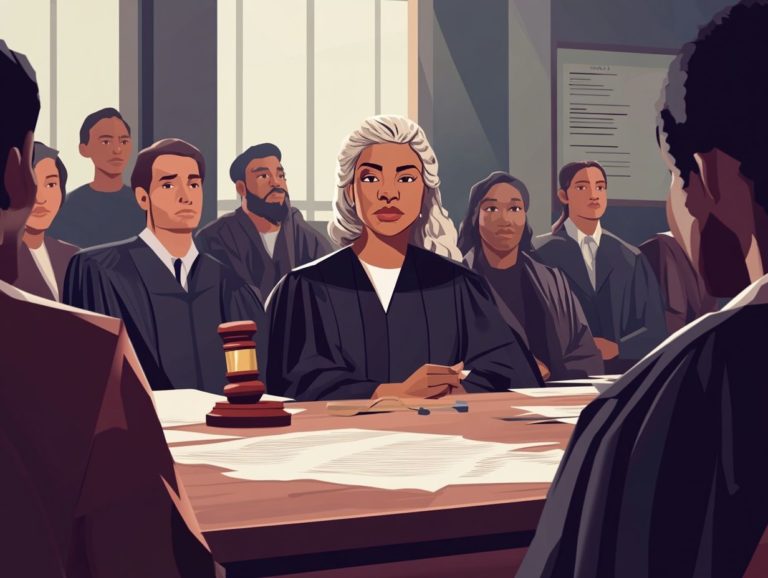Your Rights in Employment-Related Cases
Understanding your rights in the job market is essential, especially when facing issues like discrimination or wage disputes.
This guide highlights your employee rights and outlines the legal protections available to you.
It details steps to take if you encounter workplace challenges, helping you stay informed and confident.
Contents
- Key Takeaways:
- Understanding Employment Rights
- Types of Employment-Related Cases
- Legal Protections for Employees
- Steps to Take in an Employment-Related Case
- Frequently Asked Questions
- What are my rights in employment-related cases?
- What laws protect my employment rights?
- Can I be fired for exercising my employment rights?
- What should I do if my employer violates my employment rights?
- Do I have to take legal action to protect my employment rights?
- What should I do if I feel my employment rights are being violated?
Key Takeaways:

Know your rights against discrimination, harassment, and wage disputes.
Understand the legal protections under federal and state laws.
If you have an issue, file a complaint, gather evidence, and consider legal help.
Understanding Employment Rights
Knowing your employment rights is crucial for navigating the workplace, especially in Texas.
Federal and state laws protect you from unlawful actions by employers.
Stay informed about your rights regarding discrimination, harassment, and reasonable accommodations.
This knowledge empowers you to advocate for fair treatment in any situation.
Overview of Employee Rights
Employee rights include protections against discrimination based on race, gender, and other characteristics.
These protections allow you to pursue your career in a respectful environment.
Federal laws like Title VII of the Civil Rights Act prohibit discriminatory practices by employers.
Texas laws also support these protections, emphasizing the need for a safe workplace for all.
Types of Employment-Related Cases
Employment-related cases cover various issues, including discrimination and wage disputes.
Understanding these cases is vital for both employees and employers to navigate legal challenges.
Discrimination and Harassment
Discrimination and harassment create a hostile work environment and violate laws designed to protect you.
These behaviors can manifest as unfair treatment based on race, gender, or disability.
Legal frameworks, like the Civil Rights Act, help address these issues and establish reporting processes.
Employers are responsible for addressing grievances to create a safer work environment.
Wage and Hour Disputes

Wage and hour disputes often arise when you feel you re not being compensated fairly. They usually involve claims of unpaid overtime or violations of minimum wage laws.
These conflicts can happen if employees are wrongly classified as independent contractors. This misclassification means you might miss out on benefits you deserve.
Understanding the legal framework is essential. Laws like the Fair Labor Standards Act protect your rights by setting standards for pay.
If you’re unpaid for hours worked, file a claim with the U.S. Department of Labor. You can also pursue a lawsuit in state court for resolution.
Wrongful Termination
Wrongful termination happens when you are fired in violation of employment laws or contracts. This often relates to discrimination or retaliation.
For example, if you report unsafe working conditions, you might be dismissed. This raises important legal issues.
Recognizing wrongful termination means understanding how to file a claim. Gather evidence like emails or witness statements to support your case.
Legal Protections for Employees
Legal protections for employees come from federal and state laws. These laws prohibit discrimination and ensure fair wages.
They create a framework for addressing workplace grievances effectively.
Federal and State Laws
Federal and state laws set up protections for your employment rights. They guard against discrimination and harassment.
Under the Civil Rights Act, your employer must maintain a discrimination-free workplace. If you face harassment, you can file a complaint.
The Genetic Information Nondiscrimination Act protects you against using your health information in hiring decisions.
In Texas, the Texas Labor Code requires employers to implement policies preventing harassment and discrimination.
Employment Contracts
Employment contracts are vital for defining your rights and duties. They set clear expectations and protections against discrimination.
Contracts typically include terms of employment, work hours, and job responsibilities.
Many contracts include clauses against unfair treatment and procedures for grievances. This ensures a fair work environment.
Termination clauses explain grounds for ending employment. Knowing your rights to notice or severance pay is essential.
Steps to Take in an Employment-Related Case

Understand the steps you need to take in an employment-related case. It s essential for your success.
Begin by filing a complaint and carefully collecting evidence to substantiate your claims of discrimination or harassment. This approach strengthens your case. It makes sure your concerns are taken seriously.
Filing a Complaint
Filing a complaint is a crucial step for anyone who believes they ve faced discrimination or harassment. You can seek justice through the Equal Employment Opportunity Commission (EEOC) or the Texas Workforce Commission (TWC).
This process gives you the power to address your grievances. It involves documenting incidents, gathering necessary evidence, and adhering to specific timelines.
When you decide to initiate a complaint, collect relevant documentation, such as emails, witness statements, and any related employment records.
Understanding the laws and protections is vital. It ensures that your voice is not silenced during this process.
Complaints submitted to the EEOC or TWC are typically investigated promptly. Be aware of the strict deadlines for filing. Act quickly to defend your rights and take action!
Gathering Evidence
Gathering evidence is essential for building a robust case in employment-related disputes, especially in matters involving discrimination or harassment claims.
Both employers and employees must understand the various forms of evidence that can prove invaluable in these situations. Consider:
- Emails that may reveal inappropriate behavior,
- Witness statements from colleagues who ve witnessed the incidents, and
- Performance reviews that could uncover patterns of bias or unfair treatment.
Maintaining meticulous documentation clarifies events and bolsters your legal claims by providing concrete proof of what transpired.
For anyone defending their workplace rights, the importance of evidence cannot be overstated. It serves as a cornerstone for ensuring fairness and accountability in the workplace.
Legal Representation Options
Navigating employment-related cases, especially complex discrimination claims and workplace rights, requires careful consideration of your legal help options.
Choosing the right type of legal support can profoundly impact the outcome of your case. Consider hiring an attorney who specializes in employment law; these professionals have the expertise to advocate effectively for your rights.
If money is tight, look into legal aid organizations. Engaging with these professionals helps clarify your intricate legal rights and provides personal support throughout the entire process.
This ensures that you approach dispute resolution well-informed, ultimately increasing your chances of achieving a favorable outcome.
Frequently Asked Questions

Your rights in employment-related cases refer to the legal protections and entitlements you have as an employee in the workplace. These rights cover a wide range of issues such as fair wages, safe working conditions, and protection against discrimination and harassment, including your rights in fraud cases.
What laws protect my employment rights?
There are several laws at the federal and state level that protect your employment rights. Some of the most significant ones include the Fair Labor Standards Act, the Civil Rights Act, and the Americans with Disabilities Act.
Can I be fired for exercising my employment rights?
No, it is illegal for your employer to retaliate against you for exercising your employment rights. This includes reporting workplace violations, filing a complaint, or participating in an investigation or legal proceeding related to your rights.
Don t wait! Start taking the necessary steps to protect your rights today.
What should I do if my employer violates my employment rights?
If you believe your employer has violated your employment rights, first document the incident. Try to fix the issue internally by discussing it with your employer.
If that doesn t work, you can file a complaint with the appropriate government agency or consult with an employment lawyer.
Do I have to take legal action to protect my employment rights?
Not necessarily. Sometimes just talking to your employer or reporting the issue can help.
If your rights are still being ignored, you may need to take legal action to protect yourself and seek compensation.
What should I do if I feel my employment rights are being violated?
If you feel your employment rights are at risk, document the incident right away. Address the issue with your employer first.
If that doesn t work, don t hesitate to get legal advice from an employment lawyer to understand your options.






